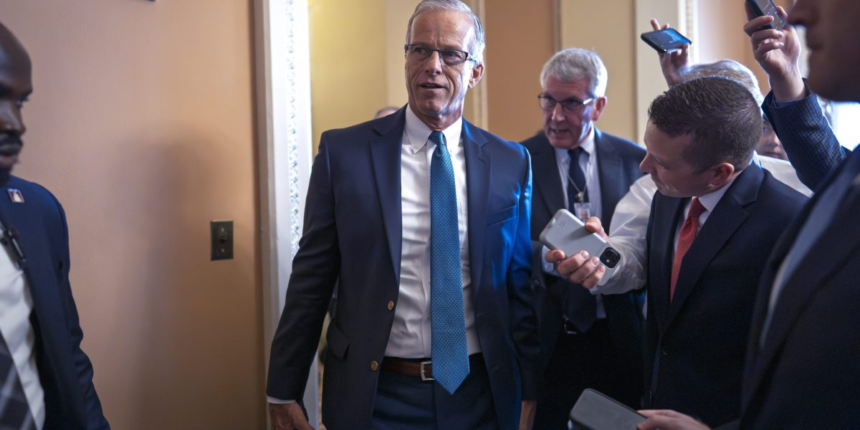Ahead of the expected roll call, the White House released a statement of administrative policy saying it “strongly supports passage” of the bill that “implements critical aspects” of the president’s agenda. Trump himself was at his golf course in Virginia on Saturday with GOP senators posting about it on social media.
“It’s time to get this legislation across the finish line,” said Senate Majority Leader John Thune, R-S.D.
But as the day dragged on, billionaire Elon Musk lashed out, calling the package “utterly insane and destructive.”
“The latest Senate draft bill will destroy millions of jobs in America and cause immense strategic harm to our country!” the former top Trump aide said in a post.
With the narrow Republicans majorities in the House and Senate, leaders need almost every lawmaker on board in the face of essentially unified opposition from Democrats.
Senate Democratic leader Chuck Schumer of New York said Republicans dropped the bill “in the dead of night” and are rushing to finish the bill before the public fully knows what’s in it.
At recent events at the White House, including Friday, Trump has admonished the “grandstanders” among GOP holdouts to fall in line.
But the spending cuts that Republicans are relying on to offset the lost tax revenues are causing dissent within the GOP ranks. Some lawmakers say the cuts go too far, particularly for people receiving health care through Medicaid. Meanwhile, conservatives, worried about the nation’s debt, are pushing for steeper cuts.
Sen. Thom Tillis, R-N.C., said he remains concerned about the fundamentals of the package and will not support the procedural motion to begin debate. Sen. Rand Paul of Kentucky has been opposed to the measure to raise the nation’s debt limit by $5 trillion. And Sen. Ron Johnson, R-Wis., pushing for deeper cuts, said he needed to see the final legislative text.
GOP Sen. Tim Sheehy of Montana said he would agree to proceeding to the bill only after being assured a provision for public lands sales he opposes would be taken out with an amendment.
But over the past days, Republicans have quickly revised those proposals and reinstated them.
The final text includes a proposal for cuts to a Medicaid provider tax that had run into parliamentary objections and opposition from several senators worried about the fate of rural hospitals. The new version extends the start date for those cuts and establishes a $25 billion fund to aid rural hospitals and providers.
Most states impose the provider tax as a way to boost federal Medicaid reimbursements. Some Republicans argue that is a scam and should be abolished.
The Senate included a compromise over the so-called SALT provision, a deduction for state and local taxes that has been a top priority of lawmakers from New York and other high-tax states, but the issue remains unsettled.
The current SALT cap is $10,000 a year, and a handful of Republicans wanted to boost it to $40,000 a year. The final draft includes a $40,000 cap, but for five years instead of 10.
Many Republican senators say that is still too generous. At least one House GOP holdout, Rep. Nick LaLota of New York, had said that would be insufficient.
“We would still like to meet that July Fourth, self-imposed deadline,” said Johnson, R-La.
Johnson and Thune have stayed close to the White House, relying on Trump to pressure holdout lawmakers.









